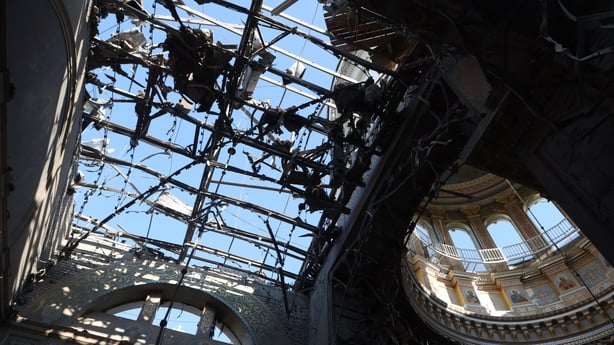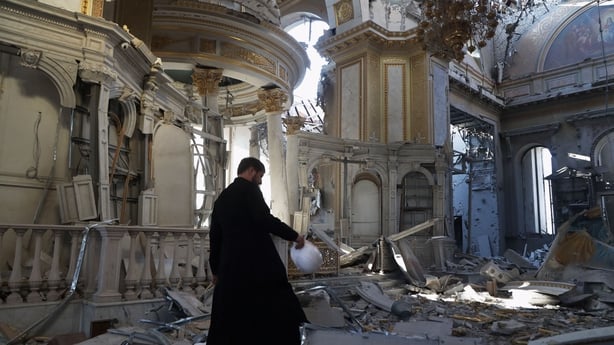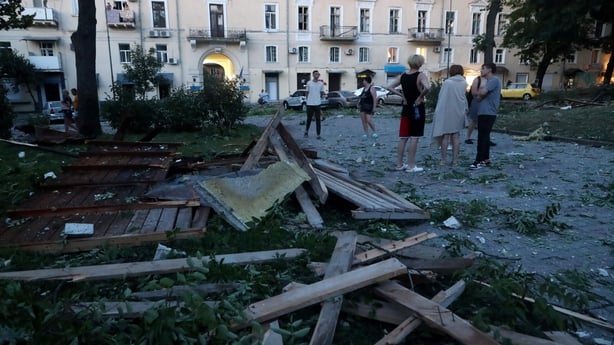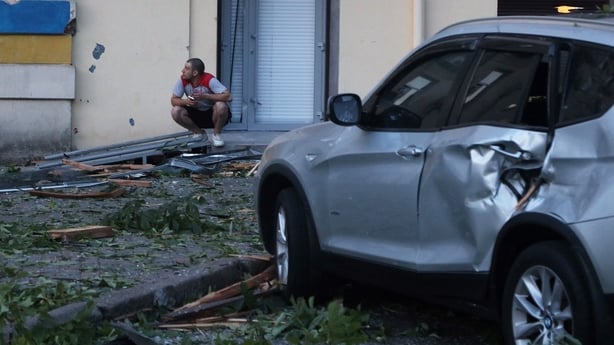Russia's latest missile attack on Odesa has left two people dead, wounded many and badly damaged a UNESCO-listed Orthodox cathedral, drawing a vow of retaliation from Ukraine's leader.
The strike on the port city, which Russia has pounded since quitting the Black Sea grain deal, came just hours before Russian President Vladimir Putin met his Belarus counterpart for talks.
Ukrainian leader Volodymyr Zelensky promised to strike back at Russia for the deadly attack, which involved 19 missiles and also wounded 22 people.
"Missiles against peaceful cities, against residential buildings, a cathedral," Mr Zelensky said. "There will definitely be a retaliation against Russian terrorists for Odesa."


Kyiv also said the Orthodox Savior and Transfiguration Cathedral under UNESCO protection in the historic city centre was destroyed, calling it a "war crime that will never be forgotten and forgiven".
Andriy Palchuk, archdeacon of the cathedral, said that both people in the cathedral at the time of the attack survived.
UNESCO condemned what it called the "brazen" attack on Odesa.
"UNESCO is deeply dismayed and condemns in the strongest terms the brazen attack carried out by the Russian forces, which hit several cultural sites in the city centre of Odesa, home to the World Heritage property 'The Historic Centre of Odesa'," the Paris-based body said in a statement.
Moscow said it had hit all its intended targets in the Odesa strike, claiming the sites were being used to prepare "terrorist acts" against Russia.
Odesa has been bombed several times since the start of the invasion, and attacks have increased since Russia said it was pulling out of a key deal which allowed the safe export of Ukrainian grain - effectively ending the agreement signed in July last year between Moscow, Kyiv, Istanbul and the UN.


Russian authorities then announced that they would consider any ships heading for Ukrainian grain ports on the Black Sea as military targets.
Kyiv has accused Russia of targeting grain supplies and infrastructure vital to any resumption of Ukrainian grain exports.
This morning, Mr Putin met with president Alexander Lukashenko for the first time since the Belarus leader helped broker a deal to end a mutiny by Wagner fighters inside Russia last month.
Read more:
Latest Ukraine headlines
Mr Putin told his Belarusian counterpart that an ongoing counteroffensive by Ukrainian forces to push back his country's troops had "failed".
"There is no counteroffensive," Mr Lukashenko said, according to the Russian TASS news agency before being interrupted by Putin: "There is one, but it has failed.
A video posted by Mr Lukashenko's press service showed the two longtime leaders arriving at Saint Petersburg's Konstantinovsky palace together ahead of scheduled talks, which Mr Putin has said will last for two days.
The attack on Odesa comes a day after a Ukrainian drone strike blew up an ammunition depot in Crimea, forcing the evacuation of the surrounding population and temporary suspension of rail traffic on the peninsula annexed by Russia in 2014.
Moscow also blamed the West and Kyiv for the death of a Russian war correspondent in the southern Zaporizhzhia region, saying he was killed by cluster munitions and promising a "response" against those responsible.

